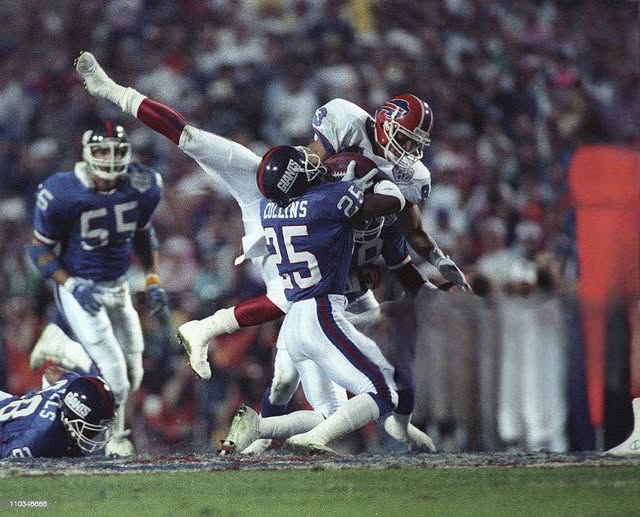The New York Football Giants’ victory in Super Bowl XXV was a masterpiece of defensive dominance, tactical brilliance, and sheer willpower. While much of the attention rightly goes to Bill Parcells’ coaching, Ottis Anderson’s MVP performance, and the legendary Scott Norwood missed field goal, one matchup defined the game more than any other: cornerback Mark Collins shutting down Buffalo Bills superstar wide receiver Andre Reed. In a game where the Giants needed every ounce of defensive excellence to slow down the high-powered K-Gun offense, Collins delivered one of the most underrated shutdown performances in Super Bowl history.
Andre Reed was no ordinary receiver—he was a Hall of Famer, a four-time All-Pro, and the centerpiece of Buffalo’s explosive passing attack. Alongside Jim Kelly and Thurman Thomas, Reed terrorized defenses all season, racking up 71 catches for 945 yards and eight touchdowns in 1990. His ability to dominate from the slot made him nearly unguardable, as his quickness, route-running precision, and yards-after-catch ability turned short passes into backbreaking plays. The Bills led the NFL in scoring for a reason, and Reed was a major part of that.
Enter Mark Collins. The Giants’ unsung hero in the secondary, Collins was a versatile defensive back who could play both corner and safety, excelling in physical man coverage. While the Giants’ defense was known for its linebackers (Lawrence Taylor, Pepper Johnson, Carl Banks) and its defensive line (Leonard Marshall, Erik Howard), Collins was the glue that held the secondary together. And in Super Bowl XXV, he wasn’t just good—he was perfect.
From the opening drive, Collins set the tone. The Bills, known for their no-huddle offense, tried to establish Reed early, but Collins was in his hip pocket on every route. Whether it was a quick slant, a deep post, or an out route, Collins matched Reed step-for-step, disrupting timing and contesting every catch. Jim Kelly, one of the most accurate quarterbacks of his era, found himself hesitating when targeting Reed because Collins simply wouldn’t give an inch.
The stats tell the story: Reed finished the game with just **five catches for 50 yards**—his lowest output of the entire postseason. Even more telling? **Zero touchdowns**. In a game where Buffalo needed its stars to shine, Reed was a non-factor, and that was almost entirely due to Collins’ suffocating coverage. The few times Reed did make a catch, Collins was right there to make the tackle immediately, preventing any extra yards. In a game decided by a single point, those small wins mattered.
But Collins’ dominance wasn’t just about coverage—it was about physicality. The Giants knew that to stop the Bills, they had to disrupt their rhythm. Collins jammed Reed at the line, rerouting him and throwing off the timing of the K-Gun offense. He played with an edge, refusing to let Reed get comfortable. By the fourth quarter, it was clear that Kelly had lost confidence in throwing Reed’s way, instead forcing passes to James Lofton or checking down to Thurman Thomas. That hesitation was a direct result of Collins’ lockdown performance.
The Giants’ defensive game plan was a masterpiece. Bill Belichick, then the defensive coordinator, famously decided to **let Thurman Thomas rush for over 100 yards** in order to take away the big plays in the passing game. The logic was simple: Thomas was incredible, but the Bills’ play-action and deep shots were even deadlier. By committing extra attention to Reed with Collins in single coverage, the Giants forced Buffalo into long, methodical drives instead of quick-strike touchdowns. And in a game where time of possession was critical (the Giants held the ball for over **40 minutes**), every incompletion or short gain mattered.
When the Bills had their final chance to drive for a game-winning field goal, Collins was still locking down Reed. On the critical 2nd-and-10 from the Giants’ 41-yard line with just over two minutes left, Kelly looked Reed’s way on a crossing route—Collins blanketed him, forcing Kelly to throw it away. That incompletion set up 3rd-and-long, and while the Bills eventually moved into field goal range, the drive stalled because Reed couldn’t get open when it mattered most.
When Scott Norwood’s 47-yard attempt sailed wide right, the Giants’ defense had completed one of the greatest game plans in Super Bowl history. And at the heart of it was Mark Collins, who turned Andre Reed—a future Hall of Famer—into a non-factor.
In the years since, Collins’ performance has been overshadowed by Norwood’s miss, the Giants’ ball-control offense, and the legacy of Bill Parcells and Lawrence Taylor. But true Giants fans know the truth: **Mark Collins won that game just as much as anyone**. Without his lockdown coverage on Reed, the Bills’ offense might have exploded for 30+ points, and the Lombardi Trophy could have ended up in Buffalo.
Super Bowl XXV was a battle of wills, and Mark Collins imposed his on Andre Reed. In the biggest game of his life, Collins didn’t just hold his own—he dominated. And because of that, the New York Football Giants were crowned champions.



